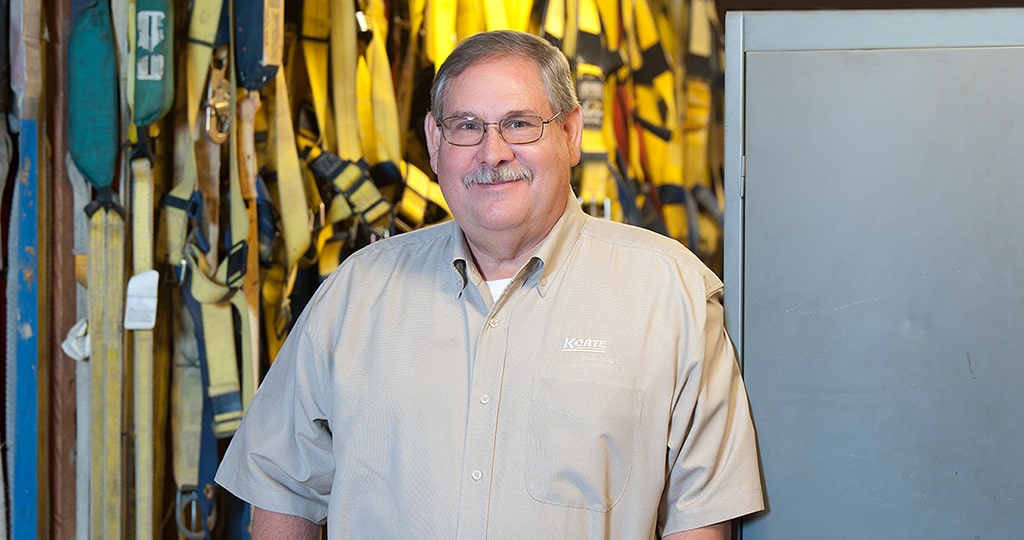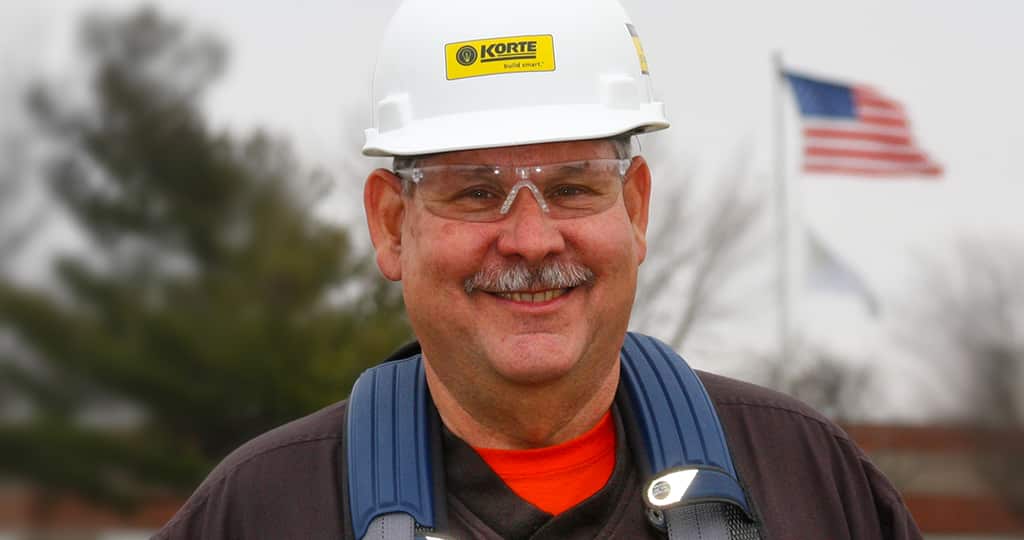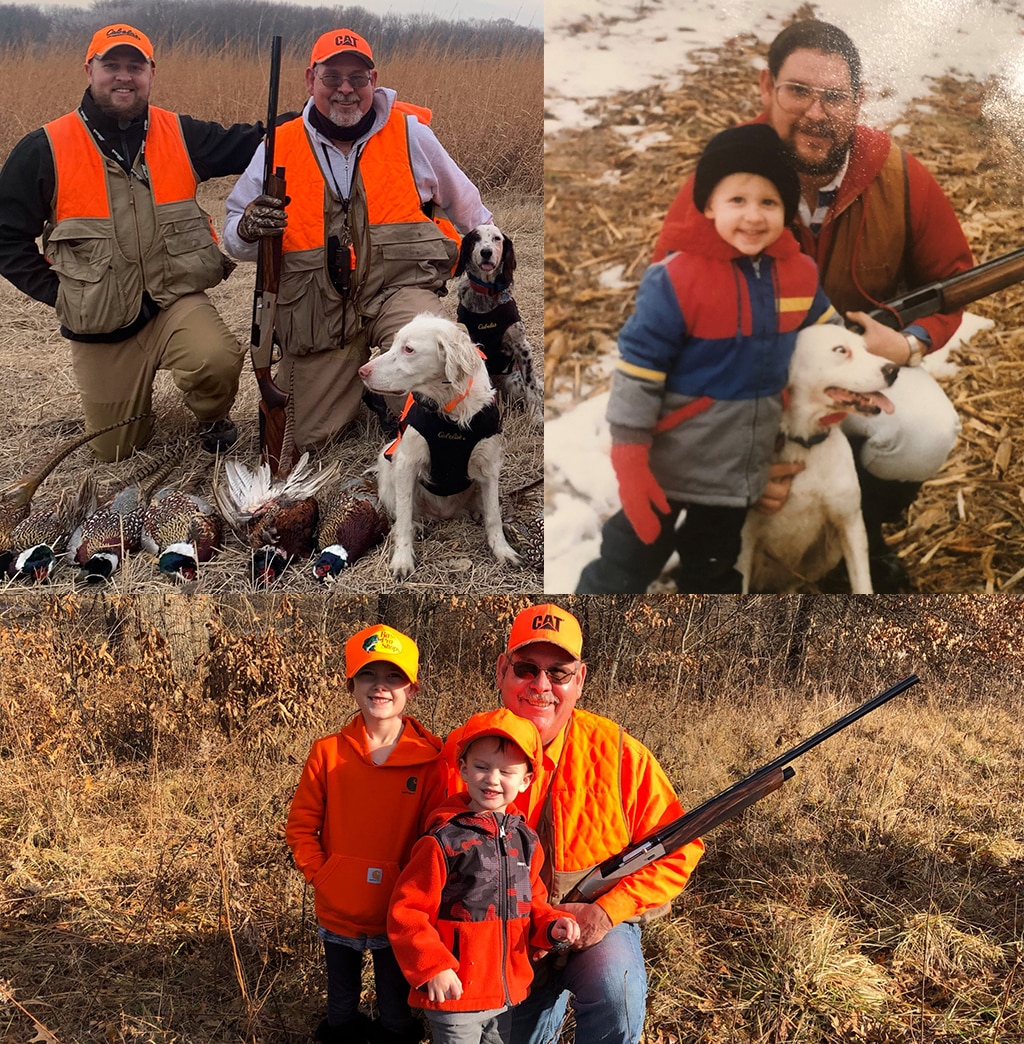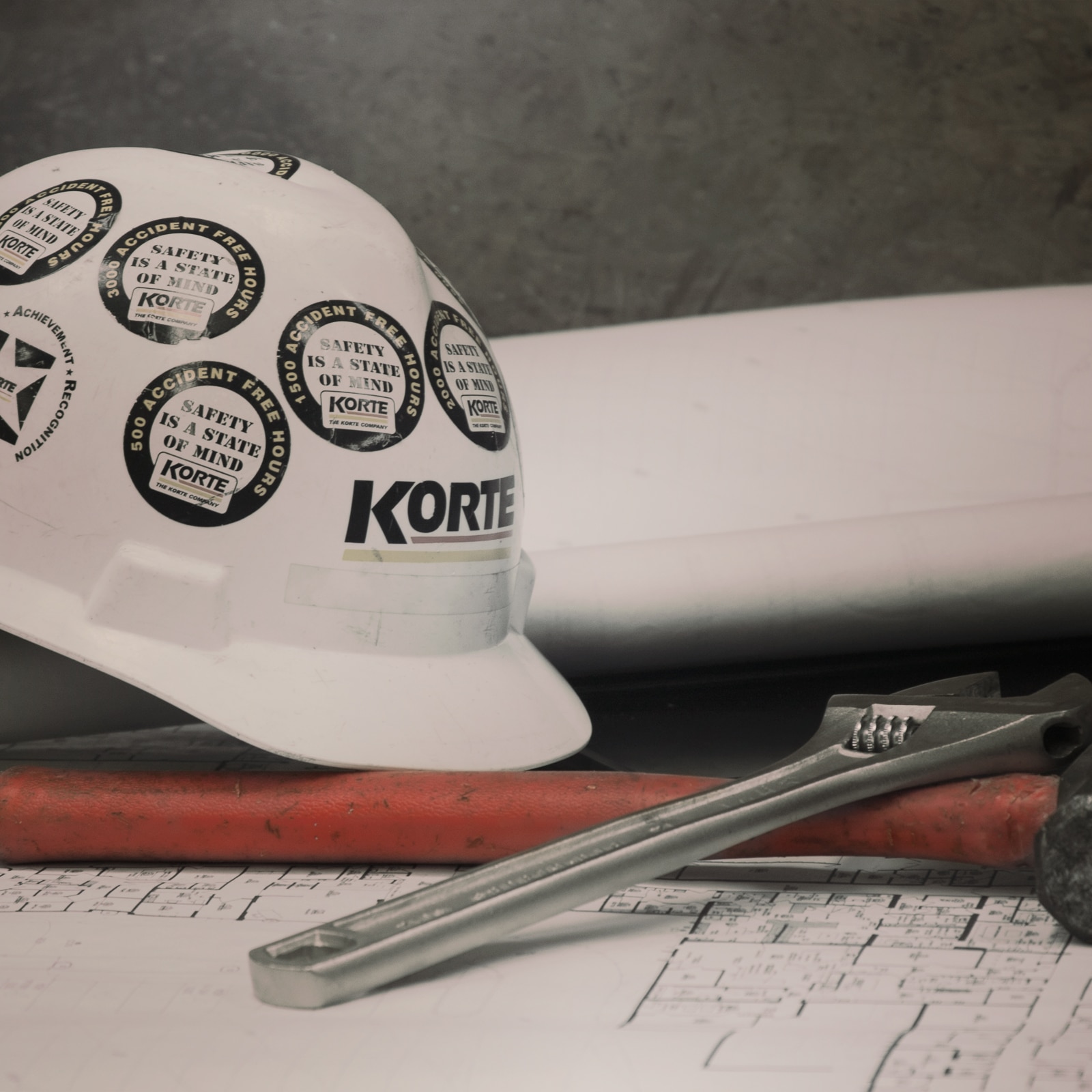When Safety Director Kevin Moorhead does his job right, it might not look like he’s doing anything at all.
“In the safety career field, we don’t always get to see the fruits of our labors,” he said, “because if an employee follows something from our training and doesn’t get hurt, there’s nothing to remember.”
Whether that means advising construction workers against taking shortcuts while handling chemicals or simply moving ladders out of the way, safety is a day-to-day job that’s best done through prevention, not response.
And in construction, small mistakes can have big consequences. Reflecting back on his career, the most memorable safety events in Kevin’s memory are the ones that stopped a crisis before getting the chance to start.
There was the crew digging in dirt without a trench box. When Kevin stopped work to get the necessary equipment in place, they grumbled and dragged their feet. After all, those boxes can be a pain to install. Then they went out to lunch.
While they were out, the dirt walls of the trench collapsed.
The thought of guys getting buried alive under a mound of soil makes Kevin shiver. It makes him glad he intervened.
Sometimes safety comes down to the right knot. OSHA requires anyone working in the construction industry to wear harnesses when they’re at heights over six feet. Proper use can literally be the difference between life and death. One day, Kevin spotted an employee on a roof whose harness wasn’t fastened correctly. But instead of reprimanding, he coached him through the correct method.
“The very next day, that person went over the edge — and dangled there. Didn’t get hurt. But if he had been tied off like he was the day before, he would have hit the ground.”
This is how Kevin knows he’s doing his job right. On rare occasions, he said, folks might even walk into his office and say, ‘Thank you.’
But he doesn’t do it for the glory.
Safety on a construction site is, at its root, about saving lives and limbs. And Kevin doesn’t like to approach his role looking to catch violations. That’s what he calls the “gotcha cop” mentality.
“That’s not how I operate.”

As Kevin sees it, his duty is to train employees into making wise decisions. Over the years, he’s learned that a personal approach is most effective. Sometimes that just means asking them to consider imagining what it would be like to live with permanent handicaps, like a crushed hand or severed spinal cord. And if that doesn’t get through to them, he asks them to think about how their injury or death would impact loved ones.
Safe job sites matter for two reasons. The first is obvious: Nobody likes seeing their team get hurt. Second, a safe job site is the smartest way to get work done. It’s part of the key ethos behind Build Smart.
“For years and years, I’ve said, ‘Safety, quality and production — all three of those go hand in hand.’”
After all, when someone gets hurt, jobs get delayed.
Risk management forecasting needs to happen before anyone ever puts a hard hat on. That’s where Kevin comes in.
Today he has a hard-earned reputation as an expert in his field. He’s even served on the Council of Certification of Health, Environmental and Safety Technologist (CCHEST), which was a branch of the Board of Certified Safety Professionals, a not-for-profit corporation that establishes standards and certifies competencies in the professional safety field. He’s occupied roles as chair, vice chair and even president.
But it wasn’t always this way. In fact, his career in construction didn’t even start until he was almost 30.
From service to safety
Kevin grew up as a self-described “military brat.” He was born in Hawaii, and his father’s career took the family all over the world — Germany, Texas and Idaho, to name a few, and eventually Illinois.
So it’s no surprise that once he graduated from high school, he joined the Air Force instead of heading off to college. While serving in Minot, North Dakota, he met Karmen, the woman who would later become his wife and the mother of his three kids.
When Kevin and Karmen both left the military in 1988, they moved back to Trenton, Illinois.
Of all the places Kevin had lived, it would forever be home.
After eight years of service, he wasn’t sure what the next best step looked like for himself, but he thought construction might be something he would like to do.
He bounced around doing odd jobs like building pheasant pens for the Illinois state conservation department and selling high-dollar siding for several months. And then a friend who owned an asphalt company in Lebanon, Illinois learned about an open position as an asphalt superintendent for The Korte Company, and he recommended Kevin.
“Lo and behold, I got an interview with Tom Korte, and he sat me down and asked me basically what I knew about asphalt. And I said, ‘Well, Mr. Korte, I know it’s black and it’s hot. But if you take a chance on me, I won’t disappoint you.’ And he hired me.”
That was in 1989, when Kevin was just 28 years old. His first title was Quality Control Specialist for Asphalt and Concrete. After a year in that role, he stepped into a project at the General Tire plant in Mount Vernon, Illinois, where he would inventory all the new German machinery and do safety.
But to say his start was seamless wouldn’t be very accurate, or very interesting.
“I didn’t know anything about safety, other than the fact that I had to wear a hard hat. It’s not always spoon-fed to you.”
On the job, Kevin quickly learned that he’d have to be a self-starter. As he sees it, safety training at its worst is through trial-by-fire, so he adapted a forward-thinking mindset and started chasing after every training class he could find.
“You’ve got to have a passion for it, I guess. I didn’t know I had it at the time because I didn’t know anything about safety. But the more I dug in, the more excited I got.”

Kevin’s contributions to The Korte Company are many, and the company has invested heavily in programs designed to take care of its workers since the 1980s. The company’s safety EMR score has never gone above 1. Throughout his 30-year tenure, Korte had 100+ successful OSHA visits nationwide, a point of pride he’s quick to pass on to the employees.
“They’re the ones that have to make this program work. I can put all the plans I want in place, but if they’re not carried out in the field, we don’t have anything,” he said.
Another contribution he’s particularly proud of is the company’s safety orientation video.
“We call it the I Know It Video so that people can’t say, ‘But I didn’t know that!’”
It’s only 12 or 13 minutes long, but it introduces new employees to Korte’s basic safety expectations. From there, he leads more rigorous training designed to keep workers safe and set them up for smart decision-making on the job. This includes 30 hours of OSHA construction safety requirements, CPR and first aid certification, fall protection, confined space training and more.
“Everything we do is for the employees, to keep folks safe and going home to their families. If you’ve ever dealt with a fatality incident or a friend killed on a construction site… the thought of some child coming up to you to say, ‘Why did you kill my dad?’ It’s heart-wrenching,” said Kevin. “If you can bring that to workers and get it into their thought process, maybe there won’t be a should’ve, would’ve, could’ve moment. Maybe if they remember that safety lesson, things will turn out well. They can retire and play with their grandkids.”
Sure, sometimes employees grouch about following what they might see as tedious regulations. Kevin’s heard every excuse in the book. But respecting those rules is non-negotiable, so he doesn’t even try to waste time trying to legitimize them. As he sees it, the most important thing to keep in mind is that workers need to follow them to keep their jobs.
“OSHA doesn’t care what you see as practical or not — you’ve got to do what they say. We’ve got some projects that go really far above OSHA standards, but they say, ‘Contractor, you’re going to abide by these safety programs no matter what.’ For example, I don’t drink energy drinks, but if somebody does, they’re not allowed on certain job sites, not even in their parking lots.”
The safety process starts long before anyone ever walks onto a construction site and picks up a hammer. One of the tougher parts of Kevin’s job is keeping track of these varying safety regulations according to the job type.
“We’ve got so many different pillars of work. We’ve got healthcare. We’ve got warehousing. We’ve got military — and the military is one of the most difficult to work in. As we bid these projects, their RFPs have got a lot of safety requirements in it. I review the safety requirements and give recommendations.”
Such recommendations are issued in the safety narrative sections of job proposals. These documents outline The Korte Company’s safety programs and plans to enact rules.
“You’ve got to have a little bit of a knack for it. I wouldn’t have ever thought I could do it.”
But for years, he has. In fact, it sometimes seems like the tougher the job, the more likely The Korte Company is to capture it — no matter their complexity or location.
Over the years, Kevin’s career has sent him all over the country.
“There are so many people that look at me going to Hilton Head or Hawaii or Key West. But I get there, do my job, visit with folks and I go. I don’t really go out sight-seeing.”
Those far-flung places hold little appeal to a family man like Kevin. Despite all that travel, he prefers staying close to home in Illinois, near Karmen and his family, along with his buddies and church.
Communing in the great outdoors
Kevin keeps a collection of shed antlers, gifts from a friend, on the file cabinet near his desk. He calls it a good conversation starter. After all, when he’s not on the clock, he wants to be outside fishing and hunting.
For years during fall and winter, he spent Sundays hunting while his family attended church.
“It’s not that I didn’t believe in Christ, but I didn’t know Christ. When the kids and wife would go to church, I’d say, ‘I’m communing with Christ in the field.’’’
His church attendance is better these days, but he still finds communion with God in the outdoors. A few years back, he volunteered with Trophies of Grace, an organization that used white-tail deer hunting as a backdrop to draw people in and share a faith-based message.
For several years, he also teamed up with Gary Korte, vice president of field production, on guided quail hunts auctioned for United Way.
And of course, he still gets a big kick out of taking family and friends quail and pheasant hunting.

Several years ago an injured friend of a friend wanted to join in on a hunt, but he couldn’t walk. He’d torn his Achilles tendon. Undeterred, Kevin used a four-wheeler to get him out in the field. With the help of his faithful English Setters Mosey and Comet, the man had several opportunities to bag a quail.
“That was pretty cool and got me thinking: When I retire, I want to try and get involved with disabled vets to get them back out in the field. If I hit the lottery, that’s what I’d do,” he said.
Even though this dream hasn’t yet manifested, he sees this as a perfect marriage of eventually honoring his prior military service and fulfilling God’s work in the outdoors.
“I would give them an opportunity, to get them out like they once did, because I can just imagine that when I can’t hunt anymore, it’s going to be rough. I’m planning for the future.”
Looking forward
Kevin is also actively involved in training the next generation of safety professionals. Over the last several summers, The Korte Company has taken on a safety intern. He oversees their development.
“It’s a great opportunity for them, and it helps Korte a lot, too. You can tell a lot from a young person that’s coming up, whether they have what it takes to be a safety person, that drive,” he said. “They’re a lot smarter than I am, let’s put it that way.”
These interns are usually college juniors or seniors who are interested in the safety profession, and sure, he says, he’s older and more experienced, but that’s just what he calls “old school.”
“A lot of safety people that are as old as I am and older — that’s how they came through. They didn’t go to school or a college. They had a job to do. I’ve always been someone that likes to serve, and that’s what safety is. You’ve got to have a passion for folks and what happens to them and their welfare. That’s what our goal is: to make sure that folks go home safe each and every day.”
Kevin was the first employee at Korte to earn a safety certification from the Board of Certified Safety Professionals (BCSP).
And while plenty of construction companies don’t have even one safety-certified employee, The Korte Company has 20 supervisors with this designation. And holding onto it isn’t easy — it requires continuing education coursework year after year.
That’s just another example of how Kevin’s trailblazing has helped establish Korte’s high safety standards.
Because of the many interpersonal challenges that working in safety requires, Kevin says that many people have told him they don’t envy his profession. He’s not sure if that’s a good thing or a bad thing.
Especially if nobody wants his job.
But he maintains that it’s about mindset and creating a supportive safety culture, one that thrives on an open-door policy.
“If they don’t think you’ve got their back when something comes up, they’re not going to call you. You want them to be able to ask, ‘Kevin, what do you think?’ That’s so important. You have to get personal with people,” he said. “I look forward in my journey over the next several years with helping to find the next Safety Director, but I don’t think I will ever fully retire from safety — there are always opportunities to train, teach, and coach folks, because safety never ends.”
